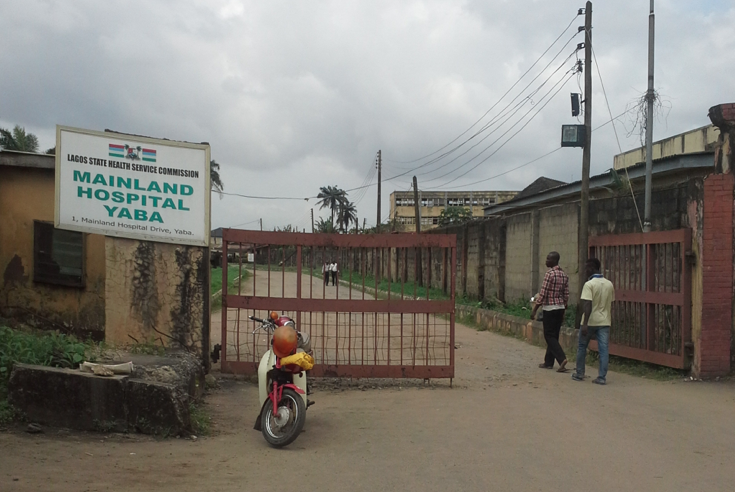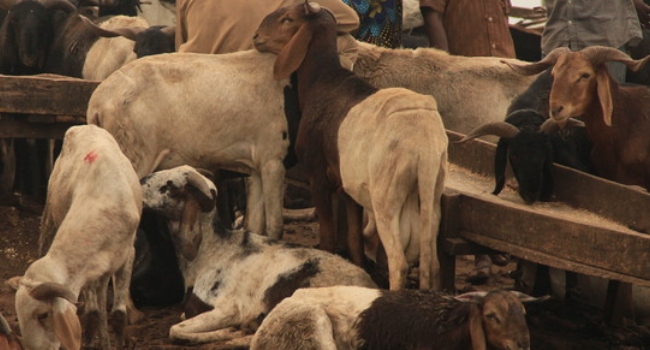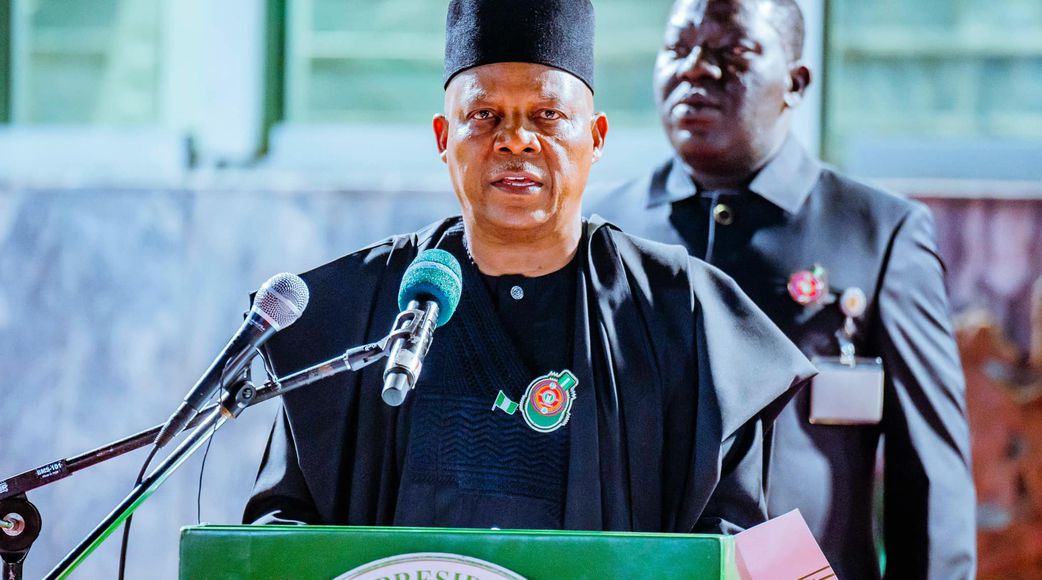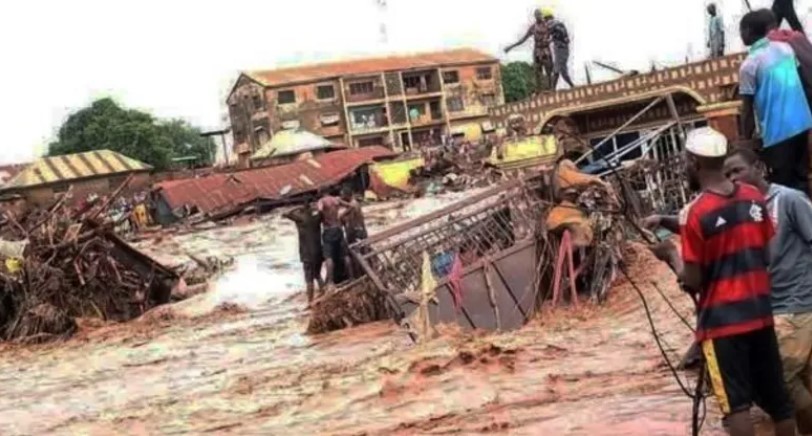INVESTIGATION: The Rejected Ebola Soldier: How Nigeria Blocked A Determined Volunteer

Thirty minutes had passed when the female guard in the reception room tapped me on the shoulder.
Did you know? You can comment on this post! Just scroll down
“You can go in now. He is around,” she said.
I rose and followed her direction into the office of the Director of Clinical Services Training, DCST, a spacious enclosure with a large LCD television and an equally large framed photo of the director.
A name plate on the wooden table introduced him as Dr. Adedokun.
Seated behind a heap of files and business cards on a table, Dr. Adedokun, was tapping the screen of his android phone, when I walked in.
He motioned me to a seat. A lady standing by the door bolted it behind me.
I had always wondered what it would feel like to be a volunteer in the Ebola Response Team, or an anti-Ebola soldier – as a colleague termed it – to help battle and contain the spread of the deadly virus in Lagos.
But what thickened my curiosity was the journalistic instinct in me. I wanted to be in the thick of things, to see things first hand and not rely on second hand reports. I discussed my plans with my editor who encouraged me to take the plunge. He emphasised that I should volunteer sincerely with all my heart but that I should come out with “one of the greatest narratives of the Ebola outbreak in Nigeria” at the end of it all.
It was that mission that brought me to the Lagos State University Teaching Hospital, Ikeja, on August 6, exactly 13 days after the death of Patrick Sawyer, the Liberian-American who fled surveillance in his country and imported the disease into Nigeria.
At the time, Ebola had killed three people, including Mr. Sawyer, and 10 people or thereabout were in quarantine at the Ebola Ward of the Yaba Mainland Hospital. Nigerian doctors were on strike and the Federal and Lagos State governments were calling on Nigerians to volunteer to help in contact tracing and in caring for those already infected by the disease.
“Please, sit down. They said you wanted to see me?” Dr. Adedokun asked, pausing for the first time from his phone activity to look at me.
“Yes. I heard volunteers are needed to care for the Ebola patients and also trace contacts. I want to volunteer.”
He seemed to size me up.
“What’s your qualification?”
“I have a Bachelors Degree in Microbiology.”
He dropped his phone, and his eyes lit up.
“Fantastic! So you want to volunteer eh? Do you have a BMLS (Bachelors in Medical Laboratory Science) certificate?”
I paused for a moment.
“Errrr, actually I ….”
He cuts in, animatedly.
“That’s fantastic. Very fantastic. Volunteers will be given N30,000 daily, the complete working kits, and they have a chance of working with the WHO (World Health Organisation) afterwards.
“They are actively, I mean actively looking for volunteers. And you read Microbiology, ah, there is a great chance that they will retain you. They will also provide insurance cover, although I don’t know the details.”
He stopped abruptly, and then picked up his phone and dialled a number and waited.
There was no response from the other end.
“Ok ok, you can take down these numbers,” he turned to me.
He reeled out the digits of four different mobile phone lines, I quickly jotted all down.
He dialled a number again, this time the person at the other end picked.
“I have a volunteer right here in my office. He is a young man and he read Microbiology. I’m sending him to you right away.”
Then he paused, nodding his head vigorously as he listened to what appeared to be a directive from the other end, before hanging up.
“You have to go to Yaba Mainland Hospital. That’s where volunteers should report to. When you get there, tell them you want to see Dr. Oguntimehin, the Incidence Manager.”
With that, Dr. Adedokun wished me luck, the lady by the door beamed at me as she ushered me out of the office.
Outside the office, I paused briefly to ponder over the sudden burst of excitement and affection I had just received. In movies, that was usually how people were sent to the gallows.
The Ebola hospital
As I said above, a lot of reasons motivated me to go apply as a volunteer, but to be honest, the financial remuneration Dr. Adedokun mentioned also got my adrenaline pumping – N30,000 daily. With a life insurance package – which would also be monetized – thrown into the mix.
About two hours after I walked out of Dr. Adedokun’s office, I walked into the premises of Yaba Mainland Hospital, with its array of ancient buildings and rusted zinc roofs.
Everybody in the hospital was wearing either a face mask or using a handkerchief to cover the nose. There were people in the complete Personal Protective Equipment, PPE, attire – long, white coat, rubber gloves, rubber boots, and face mask – moving around the compound.
An eerie quietness, the kind only seen in graveyards, permeated the place. At a nearby shed, a group of masked uniformed guards sat in ominous silence.
I was the only uncovered person as far as my eyes could see. It looked like death was circling the sky above the hospital. My first impulse was to turn and bolt towards the gate. Instead, I stood, took a deep breath, and headed towards the hospital’s Out Patient Department.
As I approached, two masked nurses, seated behind a table, motioned frantically that I should keep a safe distance from their table.
“Please, I came here to volunteer for the Ebola …”
They quickly motioned me towards another building.
“Ask for Ward B,” one of them managed to say, her voice muffled by the face mask.
I was to find out later that the Male Ward B in the hospital, which had been turned into an Isolation Unit by the Lagos State government, now goes by the name of ‘Ebola Ward.’
Outside the Ebola Ward, I met another volunteer, a medical doctor who had come from Abuja to be a part of the anti-Ebola army.
“I came here because since the doctors’ strike, I haven’t really been doing anything. So instead of just staying idle, let me come here and help,” the young doctor, a Holy Bible tucked under his arm, told me.
Together, we stood and waited, but there was no one to attend to us. I wondered why that was the case especially considering how desperate government officials were sounding at the time whenever they lament the dearth of volunteers.
A few minutes later, a lady in a WHO overall appeared and I enquired about Dr. Oguntimehin.
“Oh. He’s no longer in charge. He is the head of the Primary Health Care centre. The person you should speak to is Dr. Abdulsalam,” she said, and proceeded to give me the same phone number Dr. Adedokun had given me earlier.
I tried to call the number, and all the others Dr. Adedokun had given me; they would ring and ring without any response.
After about an hour, and still no one to talk to, we left.
The Return
On the second day, I returned to the hospital just in time to catch a (Centre for Disease Control) official tutoring 15 volunteers on safety techniques.
“I’m credibly impressed with all of you,” the official, whom I later identified as Dr. David, told the group comprising mostly of doctors, nurses, and Lagos State Ambulance Services, LASAMBUS, officials.
“If you have an Ebola Virus Disease, I could be this close with zero protection, we can have this conversation,” Dr. David said, moving within a few feet to the volunteers.
“It’s contact with body fluids. It’s how you get infected, it’s with mucosal contact. Why wear gloves on the hands? Because it usually goes to the face.”
The training session was on the best safety practices on how to avoid contact with a virus associated with one of the highest fatalities in recent times. But the manner the instructor went about the session, it could easily pass for a lecture on how to handle malaria patients.
“The virus does actually attack the brain. It doesn’t do it for everybody. I’ve not seen a health care worker put at risk because of it.
“We worry a little too much about being infected. If you already have diarrhoea and vomiting, I already know that I need to be appropriately dressed. That’s not rocket science.
“If I do everything I’m supposed to do in here (he pointed to the Isolation Unit), am I guaranteed 100 per cent that I will not be infected? Yes.”
He paused to cough.
“Excuse me, not Ebola. Just a primary cough.”
The volunteers laughed.
The lecture continued.
“Staff in hospitals have an opportunity to apply for risk assessment regarding the infection prevention control practice you are going to choose for the patient in front of you, right? You let the patient decide what you are gonna do?
“You are not afforded that kind of freedom here. Here, the process is, because we know we have patients who are contaminated, because we know the situation is high risk. Here it is a matter of process.
“And so you build the process, you build the procedures around the idea that there is some redundancy to increase safety and as you get tired and get busy, that you do things the same way every time.”
During the question and answer session, a volunteer asked what stage of the cycle of the virus an active carrier can pass on the disease.
“The method of innoculation? Think cholera. It’s hand to mouth. If a patient is not having vomiting or diarrhoea, that can be anywhere. We have seen E-coli disease, etc, present the same symptoms. It is hard to say any particular disease.
“If somebody is incubating, they are usually not infectious. Test the individual and provide some kind of care for them.”
Another volunteer asked if an insect or a fomite (an inanimate object) could transmit the virus.
Dr. David responded that the virus did not typically have a long life span outside a host.
“Also, there have been no evidence that bed bugs, for instance, transmit Ebola. But we do decontaminate anything that needs to be decontaminated.”
A volunteer asked what to do if, in the middle of taking care of an infected person, his hand gloves get torn.
“There’s a reason we have a surgical knife in the ward. Grab one and cut off the hand,” Dr. David said.
But it was a joke.
“Some people wear two gloves. My gloves tear all the time. Ideally, you change gloves after dealing with each patient.
“We also do this if we have visible contamination. I remove my outer gloves, wash my inner gloves and put on fresh gloves.”
After the lecture, which lasted for about two hours, the volunteers hung around for the next phase of their training but nobody paid them further attention.
They went home.
Later in the afternoon, I saw two middle aged women weeping profusely outside the Ebola Ward. They had been told that the corpse of their sister, the nurse who was the fourth victim of the virus, was inside the building where it will be kept until cremation.
The training for the volunteers continued the next day.
I didn’t make headway in signing up as a volunteer myself. And I began to feel that the government was insincere in its campaign that people should sign up.
The words of Jide Idris, the Lagos State Health Commissioner, kept echoing in my head, “We have a shortage of personnel. I won’t lie about that. And that is why we are asking for volunteers.”
The wait
My editor continued to encourage, pester and, in some instances cajole me to return to the Ebola hospital to try again.
Two weeks later, I returned to the Ebola Ward, and was told to go to the Central Medical Laboratory in Yaba to pick up a volunteer’s form.
At the laboratory, we (I’d been joined by half a dozen intending volunteers) were asked to pick up the forms in the next compound, housing the Psychiatric Hospital.
We got there to a small crowd of other intending volunteers. A notice on the wall informed us that every other volunteer category had been filled, except for the contact tracing and community mobilisation groups.
A lady, clutching a sheaf of papers, was going around sizing people up.
“What is Ebola?” she asked a tall fellow leaning on a wall.
“It’s a virus.”
She shook her head and walked past him.
“What did you study?” It was my turn to be sized up.
“Microbiology.”
She handed me a form.
Then raising her voice, she announced: “After filling your forms, return it to me and go home. You will be contacted via your emails and phone numbers.”
One week later and no word about my application status, I returned to the Central Medical laboratory.
A staff at the Laboratory told me, “Don’t worry. They are calling people one by one. When it’s your turn, they will call you.”
So I returned home, to wait by the phone and computer for that call and email.
The plea of Dr. Idris continued to ring in my head, “We are counting on you, our brothers and sisters to support this cause; because without you, we cannot contain this disease in Nigeria.”
I continued to wait. I’m still waiting…
(On September 18, Lagos was declared Ebola-free, with all suspected cases kept in quarantine discharged).
Sourced- PREMIUM TIMES
Article Posted 10 Years ago. You can post your own articles and it will be published for free.
No Registration is required! But we review before publishing! Click here to get started
One Favour Please! Subscribe To Our YouTube Channel!
468k
Cook Amazing Nigerian Dishes, Follow Adorable Kitchen YouTube Channel!
1.1m
Like us on Facebook, Follow on Twitter
React and Comment
Click Here To Hide More Posts Like This
Watch and Download Free Mobile Movies, Read entertainment news and reports, Download music and Upload your own For FREE.
Submit Your Content to be published for you FREE! We thrive on user-submitted content!
But we moderate!

















